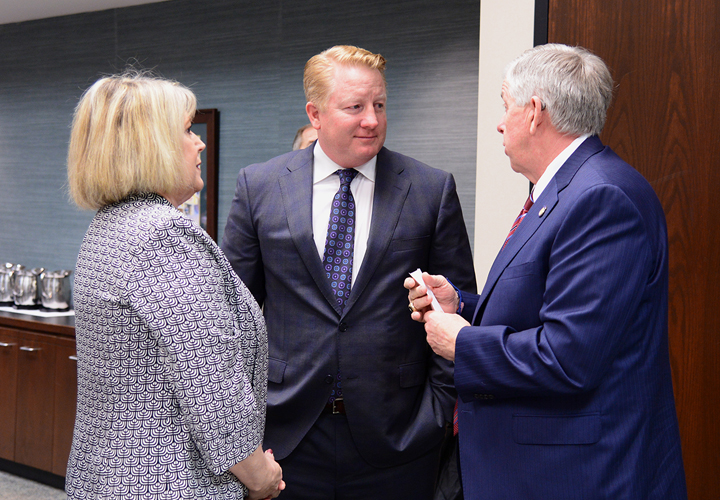Parsons visit Chamber to tout Jobs for America’s Graduates, ask for business help

Making sure students graduating from school are prepared for the next step in their lives is critical – both for their own success and so that businesses can find the talented employees they need to grow. One key to preparing those students is removing any substantial barriers to graduation.
That’s the stated goal of the Jobs for America’s Graduates program, which Gov. Mike Parson and First Lady Teresa Parson were in Springfield on March 13 to highlight.
It involves school officials identifying students facing barriers to success – some combination of poverty, family instability and personal trauma – and recommending them for the JAG program. Once in the program, they take a for-credit class with a specialist who trains them on employability and life skills, join a club that teaches them how to work in a team environment, and receive counseling, mentoring and personal support.
“Workforce development is a key issue for the state, and these kids are the future workforce,” the governor said while visiting the Chamber. “If we don’t get these kids some sort of education, they become our problem as taxpayers, trying to find other solutions for them.”
Nationally, the JAG program operates in 35 states and has served more than 1.2 million students. While the program has been around in Missouri for nearly 40 years, it went relatively unnoticed until 2014, when it began to be championed by then State Sen. Mike Parson and colleagues in the Missouri Legislature. It has grown from six school districts to more than 50 participating in 2019-2020.
“65% of all Missourians are not four-year college graduates,” First Lady Parson said. “College graduation is very important to our state, but those non-college graduates are our workforce too, and we need to help them develop. At its core, this is a school-to-work program that helps break negative cycles.”
One of the participating schools in the program is Study Alternative School in Springfield. Dalizijah Ellis is a senior at the school and participates in the program, serving as vice president of leadership development for the school’s JAG Club. She was at the Chamber event to talk about how JAG changed her outlook after meeting Study’s JAG instructor, Josh Douglas, on an OTC field trip.
“After I graduate, I’ll be attending OTC in the fall to take classes as a dietitian,” she said. “This program has changed me as a person, made me more serious, and it’s shown me the importance of hard work and what it can do for me.”
One aspect of the program that was also on display was the need for funding; JAG is funded through a public-private partnership, and it costs about $60,000 annually to fund a single classroom – only about half of which is reimbursed by the state due to funding availability.
Teri Cantwell of Central Bank said her organization has supported JAG for several years because of its impact on the students it serves. “When we invest in our kids and they do well, those are statistics we want to be involved in with our community,” she said. “And if your business wants to be involved, get involved with this program – whether it’s investing, raising awareness, or offering connections for some of these amazing students.”
But JAG Missouri Executive Director Paul Kincaid perhaps best summarized the program’s effect on the students.
“JAG students learn never to let anything, or anyone, stand in their way,” he said. “What this program gives them is hope, a chance to dream dreams – and it gives them opportunities. All they want is a chance.”
Help support the JAG program
Is your organization interested in learning more about JAG, including how you might offer financial support? The program’s website has more information about how you can help!

